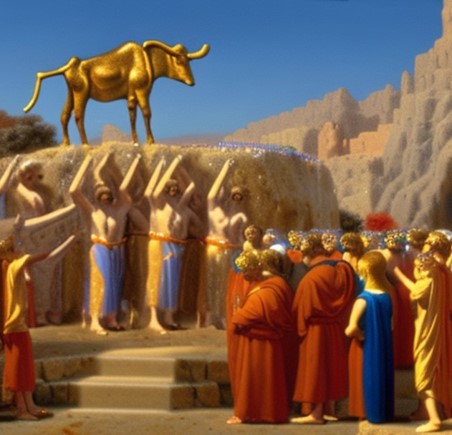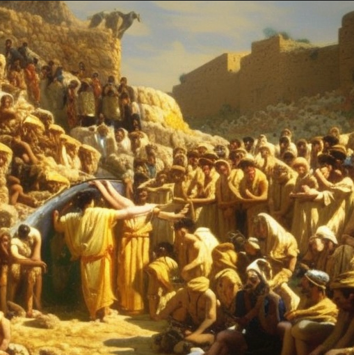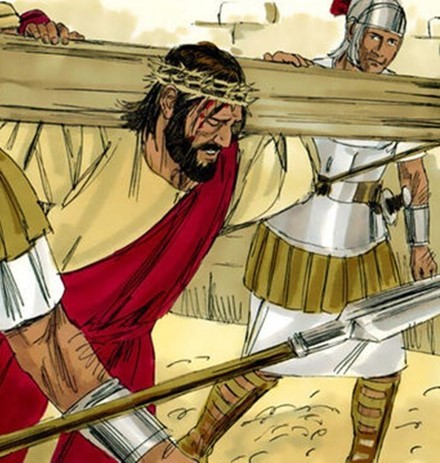Good morning!
Greetings in the name of the Father, the Son, and the Holy Spirit.
“No temptation has overtaken you except what is common to mankind. And God is faithful; he will not let you be tempted beyond what you can bear. But when you are tempted, he will also provide a way out so that you can endure it.” (1 Corinthians 10:13)

Imagine the scene: a barren desert, vast and echoing, dotted by the sprawling camp of the Israelites, their thousands of tents pitched at the foot of a looming, cloud-capped mountain – Mount Sinai. Here, in the heart of this desolate wilderness, an entire nation waits with bated breath for the return of their prophet, Moses, who has climbed the mountain to commune directly with God.
The days turn into weeks. Restlessness stirs among the people, their patience fraying as their leader remains absent. Fear seeps into the camp, filling the air with a palpable tension. The people’s anxiety manifests into a clamor for familiarity, for the tangible, for something to hold onto in this turbulent sea of uncertainty.
Aaron, Moses’ brother, stands at the helm during his absence. A spiritual leader in his own right, a High Priest appointed by God, he is expected to guide the people in this critical hour, to steer them toward faith and patience. Yet, he finds himself caught in the grip of the people’s fears and demands. The crowd presses on him, their voices a cacophony of desperation, “Make us gods who shall go before us.” (Exodus 32:1a)
And Aaron, facing the sea of anxious faces, makes a decision that echoes across centuries, a compromise that casts a long, ominous shadow over his leadership. He crafts a golden calf, giving the people a tangible deity, a clear violation of God’s commandment: “You shall have no other gods before me.”
In that one pivotal moment, the sanctuary of their faith is fractured by the hammer that molds the golden calf, by a leader’s failure to uphold God’s decree, by a compromise that shakes the very foundation of their covenant with God. Aaron’s leadership failure at this juncture of Israelite history paints a vivid and harrowing picture of the perils of failing leadership and serves as a profound lesson for leaders of all generations.

The Pressure of Leadership – An Examination of Aaron’s Challenge
Leadership is a mantle heavy with responsibilities and often fraught with pressures. It is a platform from which choices are made that can either forge paths of righteousness or yield to compromising positions. The story of Aaron is a riveting testament to the challenges faced by leaders, particularly those entrusted with spiritual guidance.
As the Israelites’ spiritual leader during Moses’ absence, Aaron was plunged into the crucible of mounting fears, heightened anxieties, and an impatient populace clamoring for a tangible god. Their plea, “Make us gods who shall go before us” (Exodus 32:1), can almost be heard echoing across the vast Sinai desert, illustrating the pressure Aaron was under.
In the face of this, Aaron succumbed to the collective fear and demand, and the result was the golden calf – a stark deviation from God’s laws. His yielding to the masses showcases the pitfalls of leadership pressured by popular demand and the potential to make compromises that can lead to catastrophic consequences.
In the New Testament, Jesus addressed this tension of popular appeal versus truth in His Sermon on the Mount. He warned, “Enter through the narrow gate. For wide is the gate and broad is the road that leads to destruction, and many enter through it. But small is the gate and narrow the road that leads to life, and only a few find it” (Matthew 7:13-14).
This directive from Christ urges leaders to choose the harder, narrower path of righteousness over the wider, easier route of appeasing the crowd. Aaron, in his moment of decision, chose the wider gate, allowing himself to be swayed by popular demand.
The Apostle Paul, too, in his letters to the early church leaders, cautioned against the perils of pleasing people over God. He wrote to the Galatians, “Am I now trying to win the approval of human beings, or of God? Or am I trying to please people? If I were still trying to please people, I would not be a servant of Christ” (Galatians 1:10). Paul’s words ring true for all leaders; when the pressure mounts, the true test of leadership lies in choosing loyalty to God’s commands over pleasing the crowd.
Aaron’s failure to resist the people’s demand, however, does not merely serve as a warning. It also prompts introspection on the pressures faced by leaders. It reminds leaders of their need for God’s wisdom and strength, and of the need for the community’s prayers and support. The apostle James encouraged, “If any of you lacks wisdom, you should ask God, who gives generously to all without finding fault, and it will be given to you” (James 1:5). Therefore, it is not only a leader’s responsibility but also the community’s role to seek God’s wisdom in times of uncertainty and pressure.
In examining Aaron’s challenge, we are called to reflect on the pressures of leadership and the importance of holding fast to God’s commands, even when it is challenging. For in the balance of leadership hangs not just the leader’s responsibility, but the spiritual welfare of those they lead.
The Consequence of Compromise – Aaron’s Misstep and its Aftermath
Aaron’s decision to succumb to the demands of the people resulted in an egregious compromise that had far-reaching implications. The golden calf stands as an enduring symbol of this lapse in judgment—a tangible representation of the heavy price that is paid when leaders veer from God’s commands.
The consequences of Aaron’s misstep were immediate and severe. The Israelites, emboldened by the creation of the golden calf, indulged in unruly festivities that would have been unthinkable under Moses’ watchful leadership. As Exodus 32:6 narrates, “they rose up to play,” engaging in actions that were contrary to the commandments they had pledged to uphold.
God’s wrath was quick to follow. He declared to Moses, “I have seen this people, and behold, it is a stiff-necked people” (Exodus 32:9). The ensuing punishment—plague and death—was a stern rebuke for the actions precipitated by Aaron’s lack of firm leadership.
This episode reverberates with Paul’s warning in his letter to the Galatians, “Do not be deceived: God cannot be mocked. A man reaps what he sows” (Galatians 6:7). Aaron’s compromise yielded a harvest of disobedience and devastation, underlining the truth of Paul’s admonition.
But the aftermath of Aaron’s compromise was not limited to the immediate physical punishment. The spiritual erosion it caused among the Israelites was an even graver consequence. It tore a rift in their relationship with God, signified by the shattering of the tablets of the Ten Commandments—a symbol of the covenant between God and His chosen people.
The New Testament underscores the peril of such spiritual compromise. In his letter to the Corinthians, Paul emphasized the importance of resisting idolatry, writing, “Therefore, my dear friends, flee from idolatry” (1 Corinthians 10:14). He further cautioned against testing Christ as the Israelites did (1 Corinthians 10:9), reminding us of the spiritual danger of such actions.
Aaron’s action, therefore, serves as a stark reminder of the high stakes in spiritual leadership. It underscores the potential for one moment of weakness to spiral into a cycle of sin and retribution. However, it also highlights the importance of repentance and seeking God’s forgiveness.
In reflecting upon Aaron’s misstep and its aftermath, it is vital to remember the mercy and grace available through Jesus Christ. The Apostle John, in his first letter, provides this comforting assurance: “If we confess our sins, he is faithful and just and will forgive us our sins and purify us from all unrighteousness” (1 John 1:9).
Thus, while Aaron’s story is a tale of caution, it also offers a message of redemption. It tells us that even when leaders fail, even when they stumble and compromise, there is always an opportunity for repentance, for seeking God’s forgiveness, and for renewed commitment to His commandments. This reminder of God’s enduring mercy is a beacon of hope amidst the harsh lessons of Aaron’s compromise.
The Demand for Accountability – A Look at Moses’ Confrontation with Aaron
The saga of the golden calf in Exodus 32 reaches a pivotal point when Moses returns from the mountain to confront the wayward Israelites and his brother, Aaron. This confrontation underscores a key tenet of leadership, spiritual or otherwise: the demand for accountability.
When Moses descends from Mount Sinai, the tablets of God’s commandments in hand, he is greeted by a scene of utter chaos. His response is immediate and decisive: he throws down the tablets, shattering them at the foot of the mountain, symbolizing the Israelites’ broken covenant with God. Then he turns his attention to Aaron, demanding an explanation for his actions.
Despite Aaron’s attempt to deflect blame onto the people, saying, “You know how prone these people are to evil” (Exodus 32:22), Moses does not waver from holding him accountable. This reflects Paul’s declaration in Romans 14:12, “So then each of us will give an account of himself to God.” Aaron, as the appointed leader during Moses’ absence, bore the responsibility for the Israelites’ actions.
This demand for accountability was not merely punitive; it was also corrective. By holding Aaron accountable, Moses pointed out the grave misstep, setting the stage for atonement and reform. It was a hard lesson on the weight of leadership and the consequences of failing to uphold God’s commandments.
This emphasis on accountability is echoed throughout the New Testament. In his letters, Paul regularly urged believers to examine their actions and confess their shortcomings. He wrote to the Corinthians, “Examine yourselves to see whether you are in the faith; test yourselves” (2 Corinthians 13:5). This self-examination is a call for accountability—to oneself, to others, and most importantly, to God.
Moses’ confrontation with Aaron also offers an invaluable lesson in confronting mistakes and seeking atonement. When faced with our failings, it can be all too easy to deflect blame, as Aaron did. Yet, as Christians, we are called to confess our sins and seek forgiveness.
This is a recurring theme in the New Testament. The apostle John offers this promise: “If we confess our sins, he is faithful and just and will forgive us our sins and purify us from all unrighteousness” (1 John 1:9). John’s message echoes Moses’ confrontation with Aaron, showing that God’s demand for accountability is accompanied by His promise of forgiveness.
In conclusion, Moses’ confrontation with Aaron after the incident of the golden calf underscores the importance of accountability in leadership. It serves as a powerful reminder that leaders are responsible for their actions and those they lead. As Christians, it calls us to examine our actions, confess our sins, and hold ourselves accountable to God’s commandments. Yet, even in the stern face of accountability, it offers a message of hope—that God is ever ready to forgive us when we turn back to Him. As leaders, as followers, as Christians, this demand for accountability, coupled with God’s promise of forgiveness, is at the very heart of our faith journey.

Reflecting on what Aaron did under pressure and what Jesus has already done for us
As we reflect on the sobering narrative of Aaron’s failed leadership in Exodus 32, it’s essential to remember that it’s not just an account of a historical event, but also a mirror held up to our own lives. The pressures that Aaron succumbed to, the compromises he made, and the consequences that ensued are more than a cautionary tale; they serve as a testament to the challenges we face in our own spiritual journey.
Consider the pressures that Aaron faced. How often have we, when positioned in a role of influence or responsibility, felt the weight of expectations from those around us? The demands, the clamoring voices, and the desire for immediate action – they’re challenges we know all too well. Yet, in such moments, we should recall the warning of Jesus in the Sermon on the Mount, where He taught about the narrow and hard way that leads to life, as opposed to the wide and easy path leading to destruction (Matthew 7:13-14). Aaron’s path of giving in to the people’s demands was wide and easy, but it led to spiritual destruction. As leaders, it’s our responsibility to stand firm, even when the narrower path is the less popular one.
Next, consider the consequences of compromise that Aaron brought upon the Israelites. It’s a stark reminder for us to remain faithful to God’s commands, regardless of the pressures we face. In the Garden of Gethsemane, Jesus Himself faced an immensely pressure-filled moment. He prayed fervently, sweat like drops of blood falling to the ground (Luke 22:44). Yet, unlike Aaron, Jesus didn’t yield to the immense pressure. He chose God’s will over the immediate relief from suffering, offering us the ultimate example of fidelity to God’s will in the face of severe trials.
Lastly, let’s reflect on the accountability that Moses demanded from Aaron. In our lives, too, we must take responsibility for our actions, particularly when we falter. Instead of deflecting blame, as Aaron attempted to do, we need to own our mistakes. In doing so, we follow the example of Jesus Christ. Despite being blameless, Christ took upon himself the sins of all mankind on the cross. His act was the ultimate symbol of taking responsibility—not for His own faults, but for ours. As we lead, as we follow, as we live our lives, this example of Christ should guide our understanding of accountability. In reality, we are all leaders of our own lives. We are responsible and accountable for our own choice and actions.
As we bring this reflection to a close, it’s worth recalling the words of the Apostle Paul: “For all have sinned and fall short of the glory of God” (Romans 3:23). Like Aaron, we too fall short. In other words, we all fail. However, in Jesus Christ, we can win. Jesus Christ, our Savior bridges this insurmountable gap between our shortcomings and God’s holiness. Even so, our failures and compromises do not and will never be the end of our story because of Jesus, who already won the victory for us.
In conclusion, the narrative of Aaron’s compromise calls us to reflect upon our life, our decisions, and our accountability before God. More importantly, it beckons us towards the perfect example of Jesus Christ, whose life, death, and resurrection offer not just the clarity of our shortcomings, but also the hope for our victory in His redemption. As we navigate our own Mount Sinai experiences, may we look to Christ, our perfect example, who guides us along the narrow path towards the victory preprared for us.

“Enter through the narrow gate. For wide is the gate and broad is the road that leads to destruction, and many enter through it. But small is the gate and narrow the road that leads to life, and only a few find it.” (Matthew 7:13-14)
